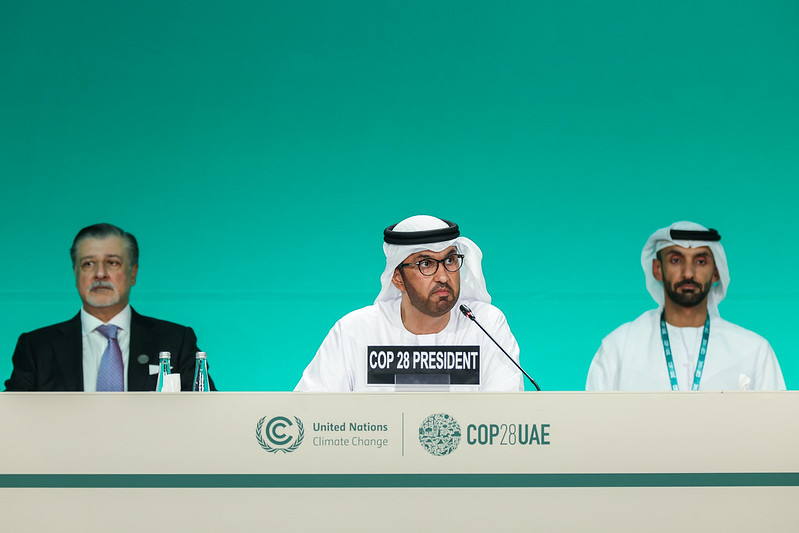The expectations for COP28, given the track record of recent U.N. climate conferences, were low. Held in Dubai earlier this month, it appeared from the outset to be a captive of the global fossil fuel industry. About 2,400 people connected to the coal, oil and gas industries, an all-time high, registered for COP28. As the dust settled following the talks, however, a mixed picture emerged, one with a few important achievements alongside some notable failures.
The president of the summit, Sultan Ahmed al-Jaber (center), is chief executive of the state-owned Abu Dhabi National Oil Company. Photo by UNclimatechange licensed under CC BY NC-SA 2.0 DEED.
Significant Achievements
- Loss and Damage Fund: The Loss and Damage Fund, dedicated to aiding vulnerable nations already grappling with the devastating consequences of climate change, marked an historic breakthrough. It acknowledges the responsibility of developed nations and their obligation to support those on the frontline of the crisis.
- Fossil Fuel: For the first time, a COP agreement explicitly called for “transitioning away from fossil fuels.” The pact represented a compromise and is not legally binding, but it should signal to investors and policymakers that a turning point has been reached.
- Methane Mitigation: Recognizing methane’s potent warming effect, COP28 implemented several measures to buttress COP26’s Global Methane Pledge, aimed at reducing anthropogenic methane emissions by 30% by 2030. The U.S. and European Union put in place new regulations and oil and gas producers announced new pledges to curb methane emissions. The latter commitments, though, were strictly voluntary.
- Adaptation: Adaptation received increased attention, with targets established on water security, ecosystem restoration, and health. By 2025, all countries must have in place a detailed plan to adapt to the current and future impacts of climate change in their countries, and must demonstrate progress in implementing such a plan by 2030.
- Financial Commitments: Data published in the run up to COP28 indicated that developed countries finally fulfilled their long overdue promise to provide $100 billion in 2022 to help poorer countries deal with climate change. In addition, initial contributions of $429 million to the Loss and Damage Fund reinforced this acknowledgement of financial responsibility.
Critical Failures
Despite these achievements, COP28 fell short in several critical areas:
- Ambition Gap: The agreed-upon measures are insufficient to limit warming to 1.5°C. The “carbon budget” for 1.5°C will be exhausted in around five years at current levels of emissions. Developed nations need to significantly ramp up their ambition and action.
- Fossil Fuel Loophole: The language about the need to transition away from fossil fuels stopped short of calling for a “phase out,” leaving room for interpretation and potential loopholes. Fossil fuel interests will continue to exert undue influence, hindering a definitive shift towards clean energy.
- Finance Shortfall: While the $100 billion target for 2022 was finally met, it barely scratches the surface of the actual need. Adaptation finance remains “woefully inadequate,” leaving developing nations struggling to cope with climate impacts.
- Equity and Justice: The voices of developing nations and marginalized communities were largely ignored at COP28. The principle of “common but differentiated responsibilities” remains unrealized, with historical polluters failing to take commensurate action.
- Human Rights Concerns: Hosting COP28 in Dubai, with its record of widespread human rights violations, raised concerns about silencing dissent and hindering meaningful participation.
The Road Ahead
COP28’s mixed bag leaves the world at a crossroads. While the achievements offer a glimmer of hope, the failures highlight the urgency of the moment. Here are some key takeaways for the road ahead:
- Increased Ambition: Developed nations must significantly ratchet up their emissions reduction targets and concretely implement their commitments.
- Just Transition: A just and equitable transition away from fossil fuels is crucial. Investments must prioritize vulnerable communities and support workers in high-carbon industries towards alternative livelihoods.
- Enhanced Finance: Developed nations must scale up adaptation funding and fulfill their responsibility to support the most vulnerable.
- Amplifying Marginalized Voices: The voices of developing nations, Indigenous communities, and other marginalized groups must be heard and acted upon. Inclusive decision-making is essential for effective climate action.
- Holding Polluters Accountable: Developed nations, historically responsible for most emissions, must take ownership of their role and provide adequate financial and technological support to developing nations.
Clearly, COP28 did not deliver the transformational change needed, but it did offer some signs of progress as well as stepping stones for future action. The time for incremental steps, though, is over. The window of opportunity is closing and we must move quickly if we hope to avoid the onset of runaway climate change. Finally, if nothing else, the climate talks underscored the importance of local climate action for generating tangible results.
